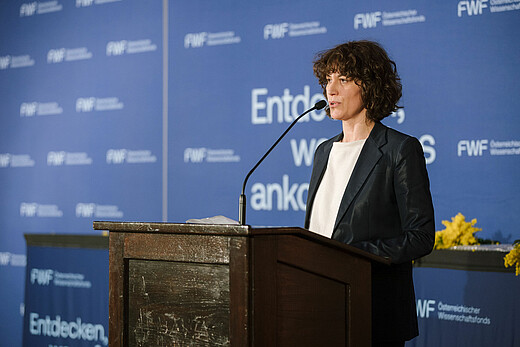
Dear representatives of the FWF, the ministries and the universities, dear guests, dear colleagues!
First of all, I would like to express my sincere thanks to the FWF – not only for awarding me the Elise Richter Prize, but also for giving me the opportunity today – especially on International Women’s Day – to give the acceptance speech on behalf of this year’s laureates.
When I was asked to give this speech, I accepted spontaneously and without thinking twice. I was delighted to do it and was sure I had a lot to say. However, as the evening approached, I became increasingly uncomfortable with the task of giving an acceptance speech on behalf of the laureates. I think there were mainly two reasons for this: Firstly, I was sure that all the laureates present here would have a lot of meaningful things to say: about their research topics, but also about their personal experiences as female scientists on the path to get here – a path which was certainly not always easy in most cases. But the other reason why preparing this speech hasn’t been easy for me lies a little deeper: Most importantly, there are times when I still can’t believe that I am now part of this circle of outstanding female scientists.
I hear time and again that some scientists have dreamed of this career since they were children – and then, despite many obstacles, naturally pursued this path. I am not one of them. Not because I didn’t find science interesting, but simply because I had no idea what a scientist does – and no one in my social environment was able to tell me. So, my path to science was anything but straightforward or obvious. It took many detours. For a long time, I was haunted by the feeling that I had come to university by mistake.
As a woman, with a migrant background, from a non-academic family, it is still – as you all know – statistically rather unlikely to pursue an academic career. As a member of such multiple minorities, one has a natural reluctance to present oneself as a minority – even if others are always happy and benevolent to do so. Nevertheless, I mention it to express my appreciation of the fact that the FWF also supports researchers whose biographies, for various reasons, have not followed a linear path, as in my case. And I believe that in a scientific world that is still very much characterised by gender inequality, this is where the particular importance and responsibility of programmes for the advancement of women lies.
I say this not only out of personal gratitude, but also and above all because I believe that non-linearity is of great importance for scientific advancement itself. When Anton Zeilinger won the Nobel Prize, there was already much discussion about how important it is to have the freedom in the process of scientific discovery to lose your way, to make mistakes – and not to align everything linearly to a predefined benefit. Many of you here today have probably experienced how precariousness and career pressures stifle this feeling of freedom to take detours and to be allowed to fail, especially among young scientists in Austria. On top of this, the imperative to be internationally mobile often implies changing the center of one’s live multiple times in just a few years.
In this respect, too, my academic biography deviates from the norm. But I am convinced that it is precisely this deviation that has been an important prerequisite for me to be standing here now: I was able to build up and develop my research over several years in a stable environment of professional and private relationships. I have benefited enormously from the stability and focus that this has provided – as important as international networks and collaborations have been in the development of my research topic.
Therefore, I would like to thank – and I think I can speak for all the laureates here – all those who have inspired and supported us, listened to us and encouraged us – our mentors, our friends and, above all, our families. And to the FWF for giving us the special privilege of being able to focus on our research within a stable framework in the next four years.